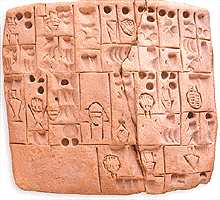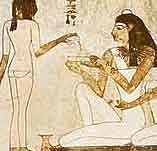Since fermentation can occur in any organic potpourri containing sugar, alcoholic beverages probably were discovered by accident, before man abandoned his food-gathering methods and settled into a farming life.
 Quite likely, fallen grapes or other fruits, perhaps even pure honey, were exposed to warm sunlight, which accelerated fermentation, and man stumbled on this aromatic concoction. He must have sampled it with curiosity and caution, and if the taste did not immediately suit him, the euphoric feeling he soon experienced was enough to send him back to the brew again and again.
Quite likely, fallen grapes or other fruits, perhaps even pure honey, were exposed to warm sunlight, which accelerated fermentation, and man stumbled on this aromatic concoction. He must have sampled it with curiosity and caution, and if the taste did not immediately suit him, the euphoric feeling he soon experienced was enough to send him back to the brew again and again.
By trial and error he discovered the chief ingredients of fermentation - fruit or grain, sugar, heat, and ageing. During seasons when fruit was not available, he learned the trick of substituting starchy vegetables: first chewing the vegetable to mix it with an enzyme (zycase) in human saliva that triggered fermentation. Although several hundred groups of preliterate societies are believed to have come up with some kind of alcoholic drink, thousands of years passed before man began cultivating crops suited specifically for the production of alcohol.
 Cultivation actually began about 4000 B.C.E., and the process of fermentation spread quickly through early civilizations. Alcoholic beverages played key roles in religious and social ceremonies, particularly births, feasts, marriages, coronations, funerals, and declarations of war and peace. Through its consumption at these events, alcohol firmly established its niche as one of the oldest and most ubiquitous drugs. According to clay tablets dating to 2100 B. C. E., beer was a common prescription of Sumerian physicians for a myriad of illnesses, and among Egyptian doctors in the next millennia alcoholic potions accounted for more than 15% of their prescriptions.
Cultivation actually began about 4000 B.C.E., and the process of fermentation spread quickly through early civilizations. Alcoholic beverages played key roles in religious and social ceremonies, particularly births, feasts, marriages, coronations, funerals, and declarations of war and peace. Through its consumption at these events, alcohol firmly established its niche as one of the oldest and most ubiquitous drugs. According to clay tablets dating to 2100 B. C. E., beer was a common prescription of Sumerian physicians for a myriad of illnesses, and among Egyptian doctors in the next millennia alcoholic potions accounted for more than 15% of their prescriptions.
 Laws governing the imbibing of alcohol were imperative almost from the outset. The first two major civilizations, the Egyptian and the Sumerian, both eventually restricted the manufacture and sale of alcohol, and by 1770 B.C.E., Hammurabi, king of Babylonia, troubled by the excessive intoxication and rowdiness of his subjects, mandated that drinking house be regulated. Exempt from early drinking laws, priests eventually replaced water in worship rites with alcohol, claiming it was essential if they were to reach the transcendent states in which they foretold the fortunes of kings and the futures of societies.
Laws governing the imbibing of alcohol were imperative almost from the outset. The first two major civilizations, the Egyptian and the Sumerian, both eventually restricted the manufacture and sale of alcohol, and by 1770 B.C.E., Hammurabi, king of Babylonia, troubled by the excessive intoxication and rowdiness of his subjects, mandated that drinking house be regulated. Exempt from early drinking laws, priests eventually replaced water in worship rites with alcohol, claiming it was essential if they were to reach the transcendent states in which they foretold the fortunes of kings and the futures of societies.
From: Browser’s Book of Beginnings: Origins of Everything Under, and Including, the Sun by Charles Panati.
 Quite likely, fallen grapes or other fruits, perhaps even pure honey, were exposed to warm sunlight, which accelerated fermentation, and man stumbled on this aromatic concoction. He must have sampled it with curiosity and caution, and if the taste did not immediately suit him, the euphoric feeling he soon experienced was enough to send him back to the brew again and again.
Quite likely, fallen grapes or other fruits, perhaps even pure honey, were exposed to warm sunlight, which accelerated fermentation, and man stumbled on this aromatic concoction. He must have sampled it with curiosity and caution, and if the taste did not immediately suit him, the euphoric feeling he soon experienced was enough to send him back to the brew again and again.

 Cultivation actually began about 4000 B.C.E., and the process of fermentation spread quickly through early civilizations. Alcoholic beverages played key roles in religious and social ceremonies, particularly births, feasts, marriages, coronations, funerals, and declarations of war and peace. Through its consumption at these events, alcohol firmly established its niche as one of the oldest and most ubiquitous drugs. According to clay tablets dating to 2100 B. C. E., beer was a common prescription of Sumerian physicians for a myriad of illnesses, and among Egyptian doctors in the next millennia alcoholic potions accounted for more than 15% of their prescriptions.
Cultivation actually began about 4000 B.C.E., and the process of fermentation spread quickly through early civilizations. Alcoholic beverages played key roles in religious and social ceremonies, particularly births, feasts, marriages, coronations, funerals, and declarations of war and peace. Through its consumption at these events, alcohol firmly established its niche as one of the oldest and most ubiquitous drugs. According to clay tablets dating to 2100 B. C. E., beer was a common prescription of Sumerian physicians for a myriad of illnesses, and among Egyptian doctors in the next millennia alcoholic potions accounted for more than 15% of their prescriptions. Laws governing the imbibing of alcohol were imperative almost from the outset. The first two major civilizations, the Egyptian and the Sumerian, both eventually restricted the manufacture and sale of alcohol, and by 1770 B.C.E., Hammurabi, king of Babylonia, troubled by the excessive intoxication and rowdiness of his subjects, mandated that drinking house be regulated. Exempt from early drinking laws, priests eventually replaced water in worship rites with alcohol, claiming it was essential if they were to reach the transcendent states in which they foretold the fortunes of kings and the futures of societies.
Laws governing the imbibing of alcohol were imperative almost from the outset. The first two major civilizations, the Egyptian and the Sumerian, both eventually restricted the manufacture and sale of alcohol, and by 1770 B.C.E., Hammurabi, king of Babylonia, troubled by the excessive intoxication and rowdiness of his subjects, mandated that drinking house be regulated. Exempt from early drinking laws, priests eventually replaced water in worship rites with alcohol, claiming it was essential if they were to reach the transcendent states in which they foretold the fortunes of kings and the futures of societies.